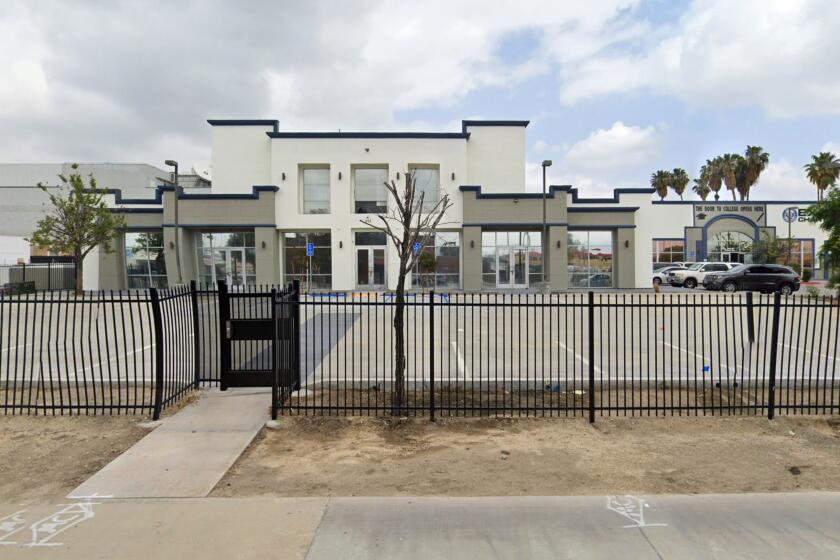Case of Catch-22 : Old Legal Files Hold a Dilemma
A legal dilemma has arisen over about 36,000 case files left without lawyers and gathering dust since the Southeast Legal Aid Center in Compton lost its financing three years ago.
Los Angeles Superior Court Judge Warren Deering issued an interim order Wednesday assigning temporary responsibility for the files to the federal Legal Services Corp. (which does not want them), at least until a May 2 hearing to determine who should take them.
The big question haunting the issue is how many, if any, clients involved in those old legal aid cases may have been harmed.
Although some lawyers say that all of the cases are closed, no one can be sure without looking into the files, and legal ethics say that no one but the attorneys of record can do that without violating the attorney-client privilege. Therein lies the Catch-22 dilemma the files present. The legal aid practitioners who handled them have long since scattered into private practice and other avenues.
More Problems Arise
So the California Bar Assn., which routinely inherits abandoned cases, stepped in this week and asked the court, in effect, to relieve those now-gone attorneys of responsibility and open the door for reassignment of the cases. But that creates other problems, since nobody seems to want the responsibility.
“Everybody’s trying to dodge the bullet,” legal aid attorney Julius Wesson, who sits in an office a floor or so below the empty office containing the files, said Wednesday. “We’re not sure where they will end up.”
Wesson is directing attorney for the Compton office of the Legal Aid Society of Orange County, which won the legal aid contract for the Compton area two years ago and soon afterward began getting unexpected inquiries regarding some of the untouched files.
“We came in (after the Southeast center lost its financing) but we couldn’t just jump in on those files,” Wesson said. “I think the real losers are the clients.”
“I just hope he (Judge Deering) doesn’t say give them to Orange County,” Bob Cohen, director of the Orange County society told The Times. “If one attorney was assigned to do it (evaluate the 36,000 case files) it’s about 20 years’ work at the rate of one hour per file.”
Cohen said his office got one inquiry involving one of the unattended files “as recently as yesterday. We just tell them the situation and (to) contact the State Bar if you have a problem.”
Cohen said he forwarded to the Bar about 10 such inquiries received in the first year after Orange County got the contract from the Legal Services Corporation to cover the Compton area.
One was from a woman who said she had asked Southeast to help her obtain an annulment but, instead, received a divorce decree that adversely affected her claim to spousal support from a prior marriage.
“She may have a claim against SELAC (the defunct center),” Cohen said.
Inconsequential, Some Say
But some say that the controversy is inconsequential.
Celia Torres, who wore the title of acting director of the former center during the phase-out, told The Times Wednesday that in the presence of an auditor from the federal Legal Services Corporation she went through all the open case files but not the closed files.
Under the financing agreement, she took responsibility for the approximately 150 open files, “some of which I still have,” said Torres, who is now in private practice in Alhambra.
Torres said the whole matter “has gotten out of hand, it’s over nothing. We are talking about 18 years of files, from since the center first opened.” She also made the point that not all the case files are lawsuits, but represent every sort of case handled by the center in 18 years.
“This shouldn’t be newsworthy in the first place,” she said.
Shift Obligation
Larry Yee, State Bar assistant general counsel who filed the application with Deering’s court this week, said the end goal is to place final responsibility for the files with the federal Legal Services Corporation, the entity that serves as a conduit for financing legal aid societies and the one that withdrew funding from the Southeast center in 1983.
“We are hoping that these (36,000 files) are in fact all closed cases. That is what SELAC (Southeast Legal Aid Center) attorneys say.” But even if a case is “closed,” Yee added, “this doesn’t mean an attorney’s obligation to his client has necessarily ended.”
According to Yee, the federal Legal Services Corporation “made a commitment” early on to take responsibility, but a spokesman for the federal agency said Wednesday it was “true, staff has spoken with the California Bar, however we do not assume responsibility for those cases--we can’t by law.”
In a telephone interview from his Washington office before Wednesday afternoon’s hearing here, Daryl Borgquist, the Legal Service Corporation’s manager of public affairs, said the federal act governing the agency does not allow it to act as a law firm.
‘Only 8 Inquiries’
“We are aware of the allegation that there are a lot of people left out in the cold,” Borgquist said. “But there have been only eight inquiries of substance relating to those files over the last three years. It’s just not true. The whole problem has been greatly exaggerated.”
Borgquist said the court here cannot direct the federal agency to do anything “if it goes against what our act allows us to do.”
He estimated that it would take between “three-quarters-of-a-million dollars and $1 million, just to go through a bunch of files.” That, he said, is “as much as the Orange County society gets in a whole year.”
More to Read
Start your day right
Sign up for Essential California for news, features and recommendations from the L.A. Times and beyond in your inbox six days a week.
You may occasionally receive promotional content from the Los Angeles Times.






